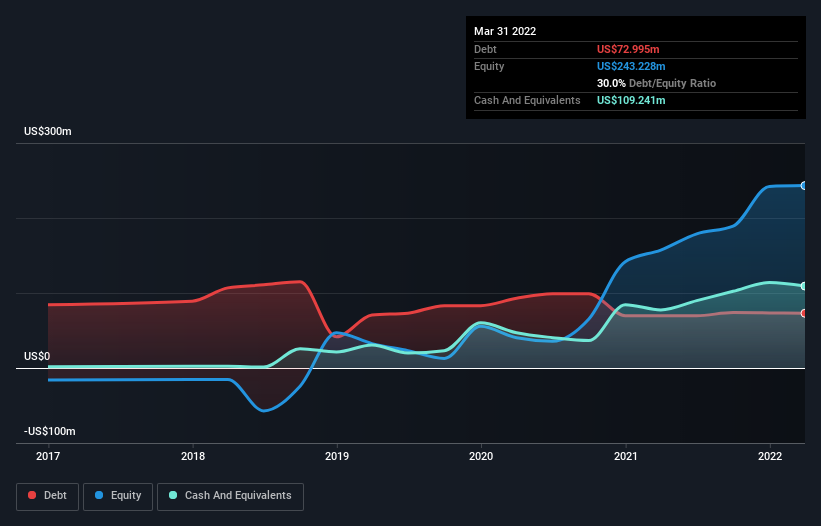Organogenesis Holdings (NASDAQ:ORGO) Has A Pretty Healthy Balance Sheet
Warren Buffett famously said, 'Volatility is far from synonymous with risk.' When we think about how risky a company is, we always like to look at its use of debt, since debt overload can lead to ruin. As with many other companies Organogenesis Holdings Inc. (NASDAQ:ORGO) makes use of debt. But should shareholders be worried about its use of debt?
When Is Debt A Problem?
Debt and other liabilities become risky for a business when it cannot easily fulfill those obligations, either with free cash flow or by raising capital at an attractive price. If things get really bad, the lenders can take control of the business. However, a more frequent (but still costly) occurrence is where a company must issue shares at bargain-basement prices, permanently diluting shareholders, just to shore up its balance sheet. Of course, the upside of debt is that it often represents cheap capital, especially when it replaces dilution in a company with the ability to reinvest at high rates of return. When we examine debt levels, we first consider both cash and debt levels, together.
Check out our latest analysis for Organogenesis Holdings
How Much Debt Does Organogenesis Holdings Carry?
As you can see below, at the end of March 2022, Organogenesis Holdings had US$73.0m of debt, up from US$69.8m a year ago. Click the image for more detail. But it also has US$109.2m in cash to offset that, meaning it has US$36.2m net cash.
How Healthy Is Organogenesis Holdings' Balance Sheet?
According to the last reported balance sheet, Organogenesis Holdings had liabilities of US$76.8m due within 12 months, and liabilities of US$116.3m due beyond 12 months. Offsetting these obligations, it had cash of US$109.2m as well as receivables valued at US$79.5m due within 12 months. So its liabilities total US$4.33m more than the combination of its cash and short-term receivables.
This state of affairs indicates that Organogenesis Holdings' balance sheet looks quite solid, as its total liabilities are just about equal to its liquid assets. So it's very unlikely that the US$645.7m company is short on cash, but still worth keeping an eye on the balance sheet. While it does have liabilities worth noting, Organogenesis Holdings also has more cash than debt, so we're pretty confident it can manage its debt safely.
Also good is that Organogenesis Holdings grew its EBIT at 13% over the last year, further increasing its ability to manage debt. The balance sheet is clearly the area to focus on when you are analysing debt. But ultimately the future profitability of the business will decide if Organogenesis Holdings can strengthen its balance sheet over time. So if you're focused on the future you can check out this free report showing analyst profit forecasts.
Finally, a business needs free cash flow to pay off debt; accounting profits just don't cut it. While Organogenesis Holdings has net cash on its balance sheet, it's still worth taking a look at its ability to convert earnings before interest and tax (EBIT) to free cash flow, to help us understand how quickly it is building (or eroding) that cash balance. In the last two years, Organogenesis Holdings's free cash flow amounted to 29% of its EBIT, less than we'd expect. That weak cash conversion makes it more difficult to handle indebtedness.
Summing up
We could understand if investors are concerned about Organogenesis Holdings's liabilities, but we can be reassured by the fact it has has net cash of US$36.2m. On top of that, it increased its EBIT by 13% in the last twelve months. So we are not troubled with Organogenesis Holdings's debt use. When analysing debt levels, the balance sheet is the obvious place to start. But ultimately, every company can contain risks that exist outside of the balance sheet. For example Organogenesis Holdings has 3 warning signs (and 1 which is a bit concerning) we think you should know about.
At the end of the day, it's often better to focus on companies that are free from net debt. You can access our special list of such companies (all with a track record of profit growth). It's free.
Have feedback on this article? Concerned about the content? Get in touch with us directly. Alternatively, email editorial-team (at) simplywallst.com.
This article by Simply Wall St is general in nature. We provide commentary based on historical data and analyst forecasts only using an unbiased methodology and our articles are not intended to be financial advice. It does not constitute a recommendation to buy or sell any stock, and does not take account of your objectives, or your financial situation. We aim to bring you long-term focused analysis driven by fundamental data. Note that our analysis may not factor in the latest price-sensitive company announcements or qualitative material. Simply Wall St has no position in any stocks mentioned.

